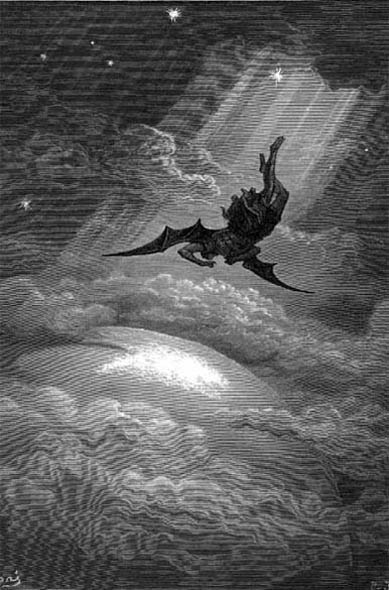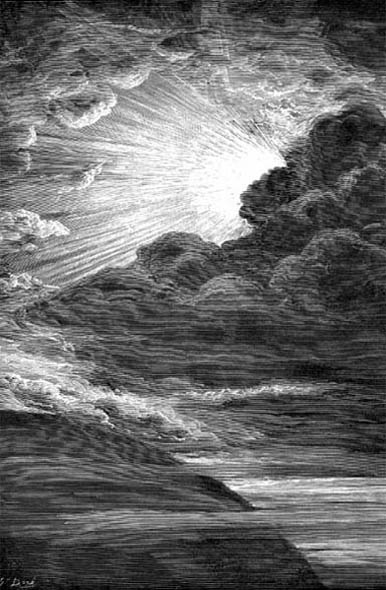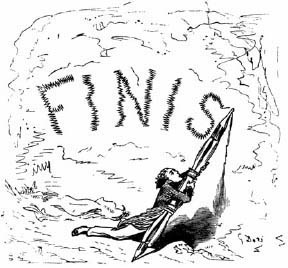A Wild Ride Through The Night (17 page)
Read A Wild Ride Through The Night Online
Authors: Walter Moers

Gustave knitted his brow.
Golden mean? What was he talking about? Did he mean the golden section? Hey, just a minute—did Death have the first idea about drawing?
‘And the paint!’ Death sneered. ‘Far too thickly applied.’
Dementia uttered a shrill laugh.
The paint?
thought Gustave.
What paint? It’s a black-and-white drawing!
Death tossed the sheet of paper aside. ‘No good at all,’ he said, turning his empty eye sockets in Gustave’s direction.
Of course!
Gustave thought suddenly. At that moment everything became clear to him.
His eyes! Death doesn’t have any: he’s blind!
Dementia tittered.
So be it
, Gustave said to himself.
He’s fooled me after all. It wouldn’t have mattered how good the drawing was, he’d have rejected it on principle
.
‘Does that mean I’ve failed the final test?’ he asked coldly.
‘No,’ Death replied. ‘It wasn’t a question of passing or failing. What matters is whether you’re
prepared to die
.’
The skeletal figure prepared to deliver a longish lecture.
‘I strongly dislike taking a human life while it’s still immature. It’s much more fun when people are fully developed and at the peak of their abilities. I prefer summoning them to me when they’ve achieved something—hence all the heart attacks they suffer from fifty onwards.’
Death cackled spitefully.
‘Just when they’re standing there crowned with success, out of breath after toiling away for years on end—just when they’re looking forward to enjoying the fruits of their labours at last— wham, bang! Carrying them off at that stage is the greatest fun of all!’ Death punched a couple of holes in space with his bony fists. ‘A soul has to be fat. Fat souls burn better, brighter, longer.
Your
soul is a scrawny little thing. Transporting it to the sun wouldn’t be worth the effort.’
Death made a dismissive gesture. ‘Go away and strive, work, struggle, fail, succeed, fail, and start again from scratch. That way, your soul will swell up like pâté de foie gras. And don’t extol life
before
it’s over, because dying is the purpose of existence. But you aren’t ready to die, not yet.
You’ve got to put in a lot more practice first
.’
Death turned away. ‘You can go,’ he told Gustave curtly, and strode off towards the house, trailing his cloak behind him. Dementia, giggling like a little girl, got up and skipped along in his wake.
‘Go? Where to?’ Gustave called after them. ‘We’re on the moon. How can I leave here?’
The sinister siblings paused and turned.
‘Oh, yes,’ Death growled, ‘you mortals still can’t fly yet. I keep forgetting that.’
He rummaged in the folds of his robe.
‘Here, take these,’ he said, producing a pair of leathery wings and holding them out. They looked as if he had removed them from an outsize bat. Gustave went over, took them, and thanked him.
‘I designed them myself. I even wear them occasionally, just for show. Strap them on, take up your position on the edge of the crater, and push off. The rest will come by itself.’
Death turned away again. Dementia emitted a silly giggle and hurried after him. Outside the front door, Death paused once more and rummaged in his robe for a considerable time. Gustave heard muffled cursing. ‘Ah, here it is!’ the skeleton exclaimed at last, triumphantly holding a key aloft.
The big raven landed on the roof just as Death went inside. Dementia slipped in after him, but before the door closed behind her she suddenly paused and looked back at Gustave through the crack, smiling.
Gustave now knew where he had already seen the door—indeed, the whole scene: on the seabed, when he was on the point of drowning.
‘We’ll meet again!’ Dementia called softly, and blew him a kiss. Then she shut the door.
GUSTAVE SCALED THE
highest pinnacle overlooking the Sea of Tranquillity. He put on the leather wings, performed a few knees-bends, and pushed off. Instantly, he shot upwards like a rocket and headed straight for the earth. ‘This is even easier than killing giants,’ he thought.
He needed no wings while flying through space; his push-off from the moon was enough to catapult him earthwards like a cannon ball. Then, when he entered the earth’s atmosphere, the winds enveloped him in their warm, gentle embrace.
For a while he enjoyed free-falling. He had experienced the most varied forms of transportation during the night, but flying by himself struck him as the pleasantest by far. ‘How wonderful,’ he thought, ‘to soar on the wind like a bird!’
He passed the time, while watching the earth draw nearer, by turning a few aerial somersaults and looping the loop.
Yes, he was right on course. There was Europe with the Italian boot protruding into the Mediterranean and, above and to the left of it, France, his native land. The continent ceased to be a vague shape and became a land mass approaching at breakneck speed.
There was Paris, a grey splodge surrounded by the yellow and green of field and forest! Fantastic! Gustave had always wanted to go to Paris. The grey splodge swiftly expanded into a spider’s web of streets, and he could already distinguish individual buildings. ‘There’s the Seine—I’m going to land plumb in the middle of the city!’ he cried exultantly. ‘I’d better use my wings now.’
He tried to flap them, but they wouldn’t move. ‘They’re still a bit stiff from the low temperatures in space,’ he told himself.
But his further attempts to flap them proved just as futile. They
remained
absolutely rigid, though the membranes between the bones fluttered in the slipstream. Gustave could now make out individual tiles on the roofs. He tried yet again to flap his wings, but they were immovable—quite useless. He was falling like a stone. ‘
If Death supplies you with something, he quality-controls it himself!
’ Pancho’s remark flashed through his mind, and he knew he was doomed to die.
He laughed bitterly. ‘So Death cheated me after all,’ he told himself. ‘He saddled me with a pair of useless wings, and I actually thanked him for them …’
Gustave saw a big, cobbled square below him—quite a typical Parisian feature.
‘I’ve become a servant of Death after all!’ That was his last thought before he hit the cobblestones.

GUSTAVE AWOKE. HE
sat up with a smothered cry, eyes wide with terror, forehead beaded with sweat, moist strands of hair glued to his scalp. Where was he? Was he dead? Around him was a grey void in which a light twinkled somewhere. A star? No, this couldn’t be space; he was in a room. There were dark walls on either side of him and a ceiling overhead. Was that a gryphon hovering below the ceiling? Yes, and fluttering beside it was a pig with wings like a bat! A dragon emerged from the darkness, opened its lizard-like jaws and spewed out a stream of orange and blue flames. Was that a damsel riding on its back? A
naked
damsel?
There, two waterspouts took shape in the corner of the room and whirled across the floor, moving in concert. A Siamese Twins Tornado, with the
Aventure
running before it! What was going on here? Shadowy, ghostly creatures were swarming everywhere: a bird hopping along on one leg, croaking hoarsely; a hunchbacked dwarf mounted on a grasshopper and waving its cap; two serpent-like monsters rolling around, locked in mortal combat; a gigantic, long-legged spider strutting along.
The whole room was teeming with adventures!
Exactly, that was it: he was dead—smashed like an egg on the cobblestones of Paris! And this was his
spatio-temporal
,
future-contingency honeycomb cell
, filled with memories of his all too brief life. He had just turned twelve. This was as far as he had got.
Then his eyes grew accustomed to the half-light, and he really woke up. Bleary-eyed and breathing heavily, he surveyed his surroundings. The bedroom—
his
bedroom—was still in darkness, but slender sunbeams were already stealing through the crack
between
the curtains. The room seemed to be the wrong way round. Then Gustave realised that he was lying with his head where his feet should have been. The bed was badly rumpled, the under-sheet half wrenched off the mattress and one pillow lying on the floor. It looked as if he’d had a violent pillow fight during the night.
He scrambled up and perched on the edge of the bed. While feeling for his slippers, his bare feet encountered the books he’d been reading the night before, which lay scattered around on the floor: Cervantes’
Don Quixote
, Ariosto’s
Orlando Furioso
, and Dante’s
Inferno
, together with his textbooks on biology, mathematics, geology, physics, astronomy and philosophy—which reminded him that he hadn’t done his homework.
But right on top lay the sketchbook in which he’d been scribbling before he went to sleep. Picking it up, he stared bemusedly at the first drawing. Its subject—Death portrayed as a black-robed skeleton seated on the terrestrial globe—had been inspired by a line of poetry he’d read. The folds of the robe were a complete fiasco, the skeleton was anatomically inaccurate. Gustave tossed the sketchbook on the floor.
‘It’s an utter failure,’ he said softly. ‘Death was right: I must put in a lot more practice.’ He rubbed his eyes and gave a hearty yawn. Then he got up off the edge of the bed, tottered over to the window, and drew the curtains.
It was broad daylight.


The woodcuts reproduced in this volume are taken from the following works illustrated by Gustave Doré:
The Rime of the Ancient Mariner
by Samuel Taylor Coleridge (
see here
,
here
);
Orlando Furioso
by Lodovico Ariosto (
see here
,
here
,
here
,
here
,
here
,
here
,
here
);
The Raven
by Edgar Allan Poe (
see here
,
here
,
here
);
Don Quixote
by Miguel de Cervantes (
see here
,
here
,
here
,
here
);
Legend of Croquemitaine
by Ernest l’Épine (
see here
);
Gargantua and Pantagruel
by François Rabelais (
see here
);
Paradise Lost
by John Milton (
see here
); and the
Bible
(
see here
,
here
).
For the benefit of those readers who would like to learn more about Gustave Doré, the following pages bear a chronology of the most important events in his life and a list of his principal works.
Anyone interested in reading an essay by Walter Moers on Gustave Doré and how
A Wild Ride through the Night
came into being should consult our website (
www.wilde-reise.de
).

